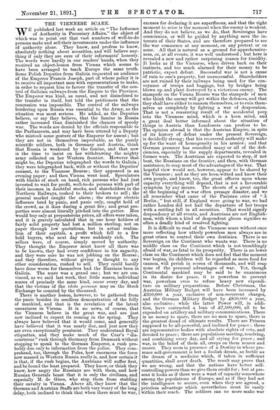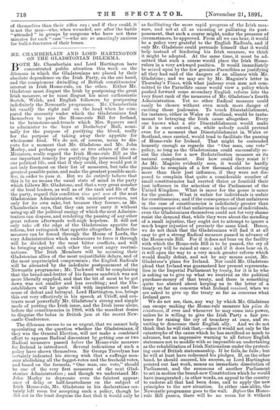THE VIENNESE SCARE.
WE published last week an article on " The Influence of Authority in Pecuniary Affairs," the object of which was to point out that vast numbers of well-to-do persons make and sell their investments under the influence of authority alone. They know, and profess to know, absolutely nothing about securities, and will believe any- thing if only they are sure of their informants' honesty. The words were hardly in our readers' hands, when they received an object-lesson from Vienna which seems to have been arranged to teach Europe the same truth. Some Polish Deputies from Galicia requested an audience of the Emperor Francis Joseph, part of whose policy it is to receive all important men with representations to make, in order to request him to favour the transfer of the con- trol of Galician railways from the Empire to the Province. The Emperor was kind, as usual, and not disinclined to the transfer in itself, but told the petitioners that the concession was impossible. The control of the railways bordering upon Russia was essential to the Army, as the situation was most serious. He added, as the Deputies believe, or say they believe, that the famine in Russia rather increased than diminished the chances of speedy war. The words are denied by the officials responsible to the Parliaments, and may have been uttered by a Deputy who mistook some gesture of the Emperor for assent ; but they are not in themselves improbable, as the purely scientific soldiers, both in Germany and Austria, think that Russia is weakened by the famine, and that now is the time to insist on her withdrawing the mighty army collected on her Western frontier. However that might be, the Deputies telegraphed the words to Galicia ; they were telegraphed back, with or without the Deputies' consent, to the Viennese Bourse ; they appeared in an evening paper ; and then Vienna went mad. Speculators with blocks of stock on hand, rich persons who had just invested to wait for profit, well-to-do persons with part of their incomes in doubtful stocks, and shareholders in the Northern Railways, rushed to their brokers to sell ; the general market caught the alarm ; the strange electric influence bred by panic, and panic only, caught hold of the crowd, as it does during a great fire ; and great pro- perties were almost literally pitched into the gutter. Men would buy only at preposterous prices, all offers were taken, and it is gravely calculated that in one hour holders of fairly solid property had lost a million sterling, not on paper through low quotations, but in actual realisa- tion of their capitals, a profit which fell to a few bold buyers, who next day were suddenly rich. The sellers were, of course, simply moved by authority. They thought the Emperor must know all there was to be known, they had every confidence in his sagacity, and they were sure he was not jobbing on the Bourse ; and they therefore, without giving a thought to any other consideration, rushed to sell. They could hardly have done worse for themselves had the Russians been in Galicia. The scare was a grand one ; but we are con- vinced, as we said last week, that little scares, individual scares of precisely the same kind, occur every day, and that the victims of the idola personae may on the Stock Exchange be counted by the thousand. There is another lesson, however, to be gathered from the panic besides its needless demonstration of the folly of mankind, and that is the revelation of the latent uneasiness in Vienna. It is no news, of course, that the Viennese believe in the great war, and are just now inclined to expect its coming in the spring. They always have believed that it would come, and generally have believed that it was nearly due, and just now they are even exceptionally pessimist. They understand Royal etiquettes, and they make much of the Czar's " dis- courteous " rush through Germany from Denmark without stopping to speak to the German Emperor, a rush pro- bably due only to information from the police. They com- prehend, too, through the Poles, how enormous the force now massed in Western Russia really is, and how certain it is that, if the rush begins, the Austrians will suffer first, and be found the least prepared. They know, or think they know, how angry the Russians are with them, and how Russian Generals boast that it is only the civilians, and especially M. de Giers, who stop them from stabling their cavalry in Vienna. Above all, they know that the German and Austrian Staffs are both very weary of the long delay, both inclined to think that when there must be war, excuses for declaring it are superfluous, and that the right moment to seize is the moment when the enemy is weakest. And they do not believe, as we do, that Sovereigns have consciences, or will be guided by anything save the in- terests of their States, and are therefore prepared to see the war commence at any moment, on any pretext or on none. All that is natural as a ground for apprehensive- ness, or, at all events, it was well understood ; but here is revealed a new and rather surprising reason for timidity. It looks as if the Viennese, when driven back on their instincts, and too much alarmed for their money to be patriotic, expect defeat. Successful war is not a cause of ruin to one's property, but unsuccessful. Shareholders are not ruined by their railways being used for the con- veyance of troops and baggage, but by bridges being blown up and plant destroyed by a victorious enemy. The stampede on the Vienna Bourse was the stampede of men who think the enemy will get within the defences, and that they shall have either to ransom themselves, or to ruin them- selves as completely by fighting a war of desperation. That is not a reassuring result of the accidental peep into the Viennese mind, which is a keen mind, and a great deal better informed about the situation of things in Austria than Londoners can profess to be. The opinion abroad is that the Austrian Empire, in spite of its history of defeat under the present Sovereign, is decidedly strong; that his recovered authority will make up for the want of homogeneity in his armies ; and that German pressure has remedied many or all of the defi- ciencies, especially in the supply departments, revealed in former wars. The Austrians are expected to stop, if not beat, the Russians on the frontier, and then, with German assistance, to reap most of the advantages of the war. That hopeful view would not, however, appear to be shared by the Viennese ; and as they are keen-witted and know their own people, and know, too, the great officers upon whose capacity everything will depend, that is not a favourable symptom by any means. The shouts of a great capital at the beginning of a war often presage disaster, and we all remember what came of the Parisian cries of " Berlin ; " but still, if England were going to war, we had rather London did not hail the departure of her troops with a rattling fall in all securities. That would signify despondency at all events, and Austrians are not English- men, with whom a kind of despondent gloom signifies so often a deadly kind of resolved fighting.
It is difficult to read of the Viennese scare without once more reflecting how utterly powerless men always are in great crises to control their own destinies. There is no Sovereign on the Continent who wants war. There is no middle class on the Continent which is not tremblingly afraid of war, as fatal to its prosperity. There is no lower class on the Continent which does not feel that the moment war begins, its children will be regarded as mere food for cannon, will perish in scores of thousands, and will reap none of the personal advantages of war. Yet, though Continental mankind may be said to be unanimous in its desire for peace, it is powerless to prevent war, powerless even to refuse heavy new expendi- ture on military preparations. Before Christmas, the Austrian Military Budget will have been increased by £350,000 a year, exclusive of non-recurrent charges, and the German Military Budget by £850,000 a year, also exclusive ; while the latter Power will, in addi- tion, have contracted a loan of £7,500,000, all to be expended on artillery and military communications. There is no money to spare, there are no men to spare, there is the greatest dread of ultimate results. There are Princes supposed to be all-powerful, and inclined for peace ; there are representative bodies with absolute rights of veto, and devoted to peace; there are populations meeting, resolving, and combining every day, and all crying for peace ; and war, in the belief of them all, creeps on them nearer and nearer. They seem in presence of a Destiny in whose pre- sence self-government is but a foolish dream, as feeble as the dream of a medicine which, if taken in sufficient quantities, shall avert death. The result may prove that we are wrong, and that the nations have better self- controlling powers than we give them credit for ; but at pre- sent it looks as if there were a want of capacity somewhere among the populations of Europe, and as if they had not the intelligence to secure, even when they are agreed, a priceless advantage which nevertheless must lie easily within their reach. The soldiers can no more make war of themselves than their rifles can ; and if they could, it is not the men—who, when wounded, are after the battle " attended " in groups by surgeons who have not three minutes for each " case "—who are so amazingly anxious for bullet-fractures of their bones.



















































 Previous page
Previous page